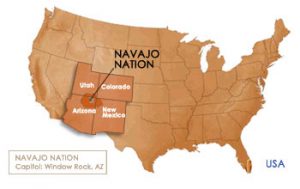Southwest tribes respond to coronavirus
 ALBUQUERQUE – The Navajo Nation has set up a Health Command Operations Center to combat the coronavirus as cases of the pandemic continue to increase.
ALBUQUERQUE – The Navajo Nation has set up a Health Command Operations Center to combat the coronavirus as cases of the pandemic continue to increase.
In a press release on April 22, the Command Center reported that there were 1,282 positive cases of coronavirus on the Navajo Nation and a total of 49 deaths. That’s up from a report on April 3 when a spokesman for the Department of Health reported 214 cases of the virus and seven deaths. (Update: As May 4, the Navajo Nation reported 2373 cases with 77 deaths)
Crystalyne Curley, Public Information Officer at the Center in Window Rock, said that in addition to offering information, the center includes a mental health hotline and medicine men to talk to people who call.
“There has been a drastic increase (of cases) in the past two weeks,” Curley said.
The Center also delivers “care packages consisting of household necessities, non-perishable foods, fabric face masks, disinfectant supplies, livestock feed/ pet food and other needs to families, elders and high risk individuals impacted by COVID-19,” the respiratory disease caused by the virus.
And, they have set up smaller operations centers throughout the reservation to coordinate with chapters for basic needs, she said.
They also include curbside pickup meals at schools, Curley said.
One problem on the reservation is a lack of health care facilities, Curley said, with nine hospitals total on the reservation which includes 25,000 square miles spread over portions of New Mexico, Arizona, Utah and Colorado. There are about 300,000 Navajos with about half of these living on the reservation.
To encourage residents to stay at home to combat the virus, tribal officials are continuing to enforce a curfew of 8 p.m. to 5 a.m. on weekdays and a 57-hour weekend curfew from Friday evening to Monday morning. Police set up roadblocks and issue citations to residents who are not on essential business or are not traveling to work. Violators can receive a citation with 30 days in jail and/or a fine of $1,000.
In addition to urging residents to wash their hands often, wear face masks, and gloves in public places, practice social distancing and limit gatherings to five people, officials now ask one person from each family to purchase essential items rather than go shopping in groups.
In March, the tribe issued an order blocking non-residents from visiting the reservation. Outsiders are banned from the reservation unless they are delivering essential items or are on essential business.
Tribal leaders have established virtual town halls on radio and television to disseminate information to the public. And, this week the tribal government announced that it is closing the executive branch of the government offices until May 17
Curley outlined some factors unique to the Navajo reservation and culture that may increase the numbers of people with the virus.
“Navajo Nation is a food desert. There are only 12 or 13 grocery stores on the reservation so people go to border towns to purchase groceries, livestock feed and sanitation items,” she said.
Also, according to Navajo tradition, many members of the same family live in homes that are close together and may include several generations in the same household which enables a virus to move easily from person to person.
Another problem is that 30 percent of the households on the reservation lack running water, and plumbing making sanitation difficult.
The numbers of coronavirus cases are also increasing among the 19 Indian Pueblos in New Mexico although exact figures are not available. Websites for the individual tribes show that they are issuing orders to shelter in place, wash hands and limit trips to stores.
The pueblo tribes have issued orders banning outsiders and closing reservations to all unnecessary deliveries of goods and they have curfews in place.
The Sandia Pueblo just north of Albuquerque has closed its resort, casino and golf course, according to its website.
The Zuni pueblo on the west side of the state, is considered the most heavily populated pueblo with 10,000 members. It has issued a stay at home order and stated that the pueblo is closed to the public and it discourages community members from traveling out of the community. Non-tribal members are not allowed onto the reservation except for necessary business. All tribal lakes are closed to fishing and recreational activities.
“All access in and out of the Zuni community is closed and road barriers set up,” according to their website.
At Acoma Pueblo, which is a top tourist destination 60 miles west of Albuquerque, business enterprises are closed as are tours of the pueblo and the casino and hotel. Only essential employees can travel outside of the pueblo. Offices are closed and non- residents are prohibited from visiting.
The San Felipe Pueblo, with 3,700 members, reports 54 cases of COVID19, the respiratory illness associated with the coronavirus. Its website, says “it is not OK to visit relatives or friends residing in other homes. If you have symptoms isolate at home or go to the Buffalo Thunder Alternate Care, a resort owned by the Pojoaque Pueblo now set up to care for those who are ill.
(Contact Katherine Saltzstein can be reached at salty23@aol.com)
